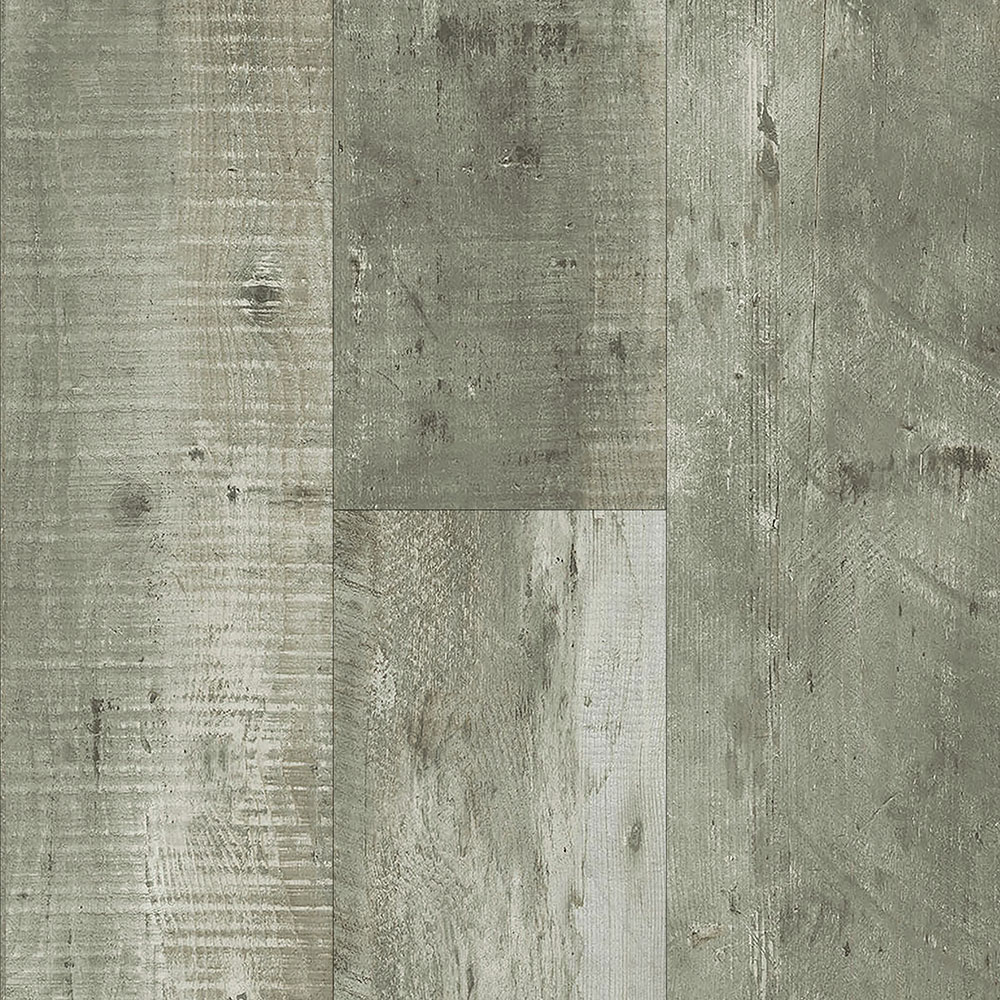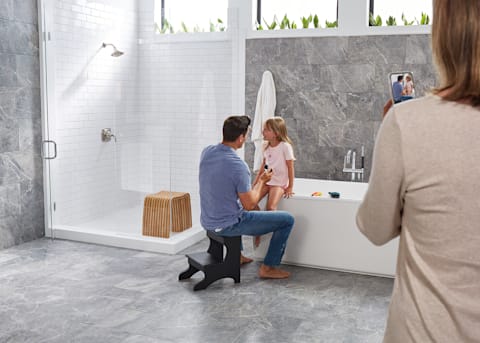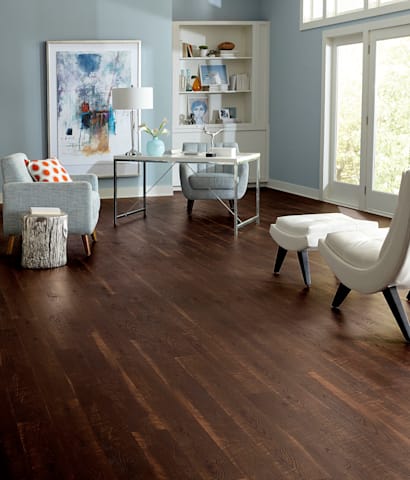- Home
- Education
- Flooring Basics
- Vinyl vs. Tile Flooring
Vinyl vs. Tile Flooring
Having trouble choosing between vinyl and tile flooring for your home? Discover the differences and benefits of both types.
The first step of your flooring journey is choosing the right product for your home. You'll want to consider the needs of your space as well as your lifestyle and home décor. If you're looking for flooring that's waterproof, kid proof, and pet proof, then you might find yourself trying to decide between vinyl and ceramic or porcelain tile. These resilient flooring options provide great value and versatility. Both materials possess unique qualities that can enhance the ambiance and feel of your space. Don't know which is right for your home? We’re here to help. Keep reading to learn more about the differences between vinyl and tile flooring.
Look and Style
You may be surprised to learn that you can achieve many of the same looks with both vinyl and tile flooring. Today's vinyl plank flooring offers authentic stone looks as well as wood effects—and both at a great value. With vinyl, you get a wide variety of customization options that allow you to choose the best style to fit your home’s décor. For example, if you're going for a traditional look, check out our Americana Collection.
Porcelain and ceramic tiles offer a classic and timeless look. And like vinyl, tile is also available in various colors and styles. Not only do you get all the stone-look designs that you'd expect, but you'll find wood-look options in our selection, too. What you'll enjoy about this flooring type is its versatility. Tile looks great in all areas of your home, from entryways to kitchen floors and bathroom walls. Why not install it in multiple areas to tie your whole interior design together?
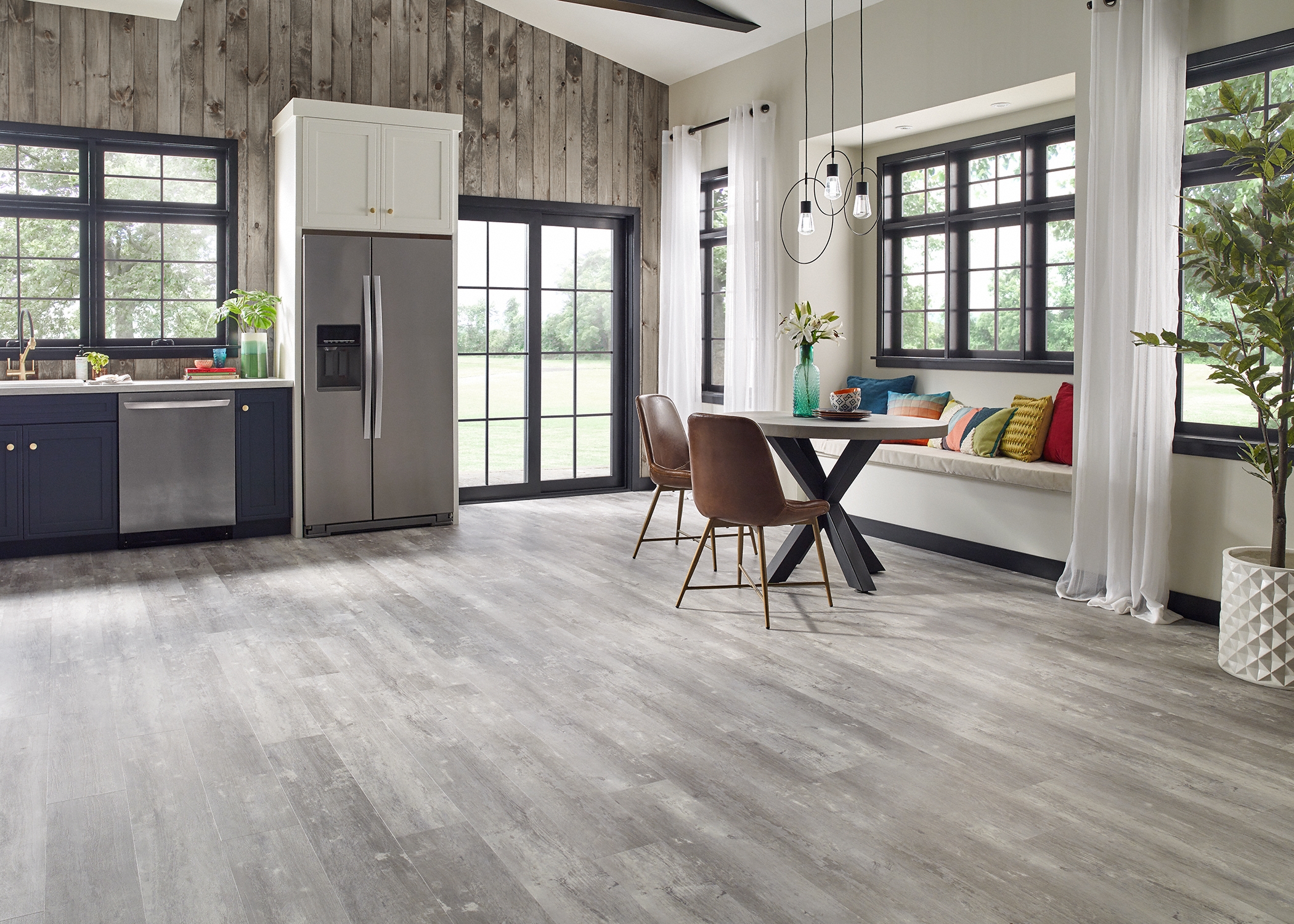
8mm w/pad Moonlight Pine Waterproof Rigid Vinyl Plank Flooring
Resilience and Water Resistance
If you're looking for affordable flooring with impeccable scratch and dent resistance, vinyl and tile are both strong choices. Thanks to its protective wear layer, vinyl is tough enough to handle the hustle and bustle of a busy home—from the pitter-patter of tiny feet to pet claws. If your goal is to protect the most active areas of your bustling household, our RVP selection includes an SPC core (stone polymer composite), making it one of our most dent-resistant choices. Our vinyl planks are also waterproof, making them resistant to everyday spills and splashes.
In addition to being waterproof and robust, tile is very resistant to scratching, staining, and fading. So, it can be comfortably installed in wet areas such as bathrooms and kitchens. Its resilience and waterproof properties make tile ideal for outdoor spaces, like patios.
Cost
Vinyl is generally the less expensive option of the two. Whether you choose peel-and-stick vinyl, which has a pre-applied adhesive for straightforward installation, or a click-float construction, vinyl comes at the lowest price point and is DIY-friendly. If you're having your flooring professionally installed, you can expect this to add a few dollars per square foot. But, given that the peel-and-stick installation method is specifically designed for DIY-ers, you could save costs if you're prepared to tackle the project yourself—we'll get more into that a little later.
On average, porcelain and ceramic tiles cost more than vinyl flooring per square foot. The final installation cost will depend on the complexity of your particular project and professional labor costs in your area, but installing tile is generally more expensive than installing vinyl due to the expertise required. You can check out our in-home installation estimate service for your flooring project.
Maintenance and Care
Vinyl is one of the easiest materials to clean. Its smooth surface makes it easy to sweep away debris. And because it's waterproof, you can wet mop vinyl flooring as needed. You can even use a steam mop (on a low setting) if a deeper clean is required.
Similarly, tile flooring is simple to maintain. The only difference is that the grout between the tiles may need extra attention to avoid dirt buildup. But don't worry, a specially formulated grout cleaner will take care of this.
Installation
Vinyl is available in DIY-friendly options. There's peel-and-stick, where the adhesive is applied ready for you, and click-together options that you can install as a floating floor or glue down. While some vinyl flooring comes with an attached pad, we recommend additional underlayment to enhance sound and thermal properties. Plan on installing vinyl over concrete? You'll need a moisture barrier, which prevents moisture from damaging the vinyl.
Laying tile flooring requires a little more expertise, as well as more equipment. The tiles are installed using mortar applied directly to properly prepared concrete or wood subfloors. You may also need to cut partial tiles to size with a snap cutter or wet saw. Once the mortar dries, fill the joints with mortar-based grout, and certain grouts will also need sealing. It's possible to take on this project yourself, but we recommend contracting an independent flooring professional.
Tiles can be .. Grout is generally applied to the joints the day after tile is installed. For more full guides and tips on each installation, check our Flooring 101 pages.
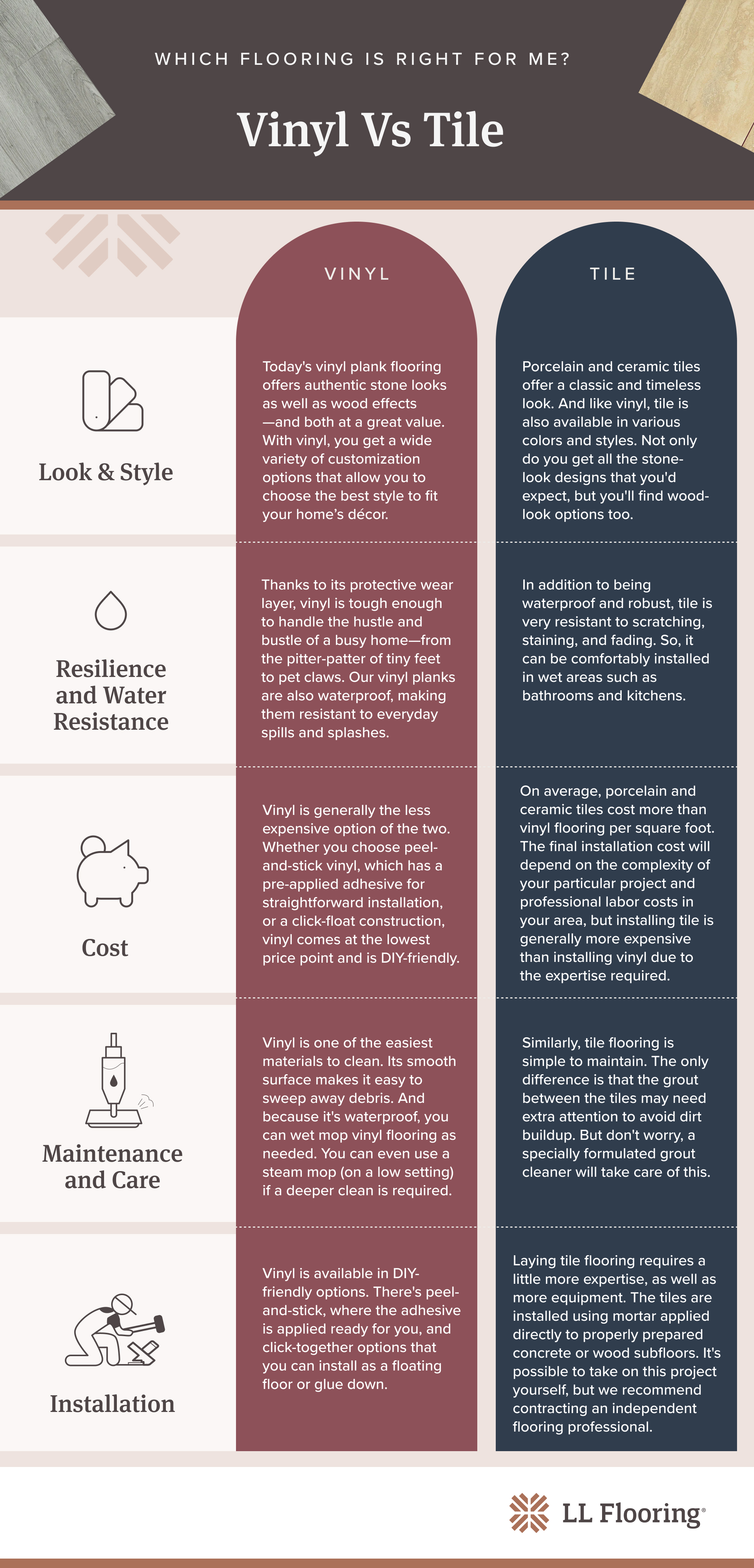
Vinyl vs. Tile: FAQs
Do you still have questions about vinyl versus tile flooring? Below, we've answered some common queries about the two options:
Is Vinyl Better Than Tile?
Both vinyl and tile are comparable and have many of the same qualities—i.e., waterproof, scratch resistant, and versatile. Since both have these advantages, either could be a suitable option for your project, depending on the needs of your space.
Which Lasts Longer, Vinyl or Tile?
Depending on specifications, both vinyl and tile can last a lifetime. Tile can be made from ceramic or porcelain, materials that have a maximum lifespan approaching 40 years. What's more, both ceramic and porcelain tile have limited warranty options to give you peace of mind. Our vinyl flooring, many of which come with a limited lifetime warranty, can last for years and years with proper maintenance.
Is Vinyl or Tile Better for My Kitchen?
Vinyl and tile flooring are impervious to spills and splashes, so you can install either in any room on any floor of your home. That means it's just a question of your design preferences.
Which Flooring is Right For You?
The flooring you choose depends on your personal style, lifestyle needs, and budget. Regardless of your decision, vinyl and tile yield many benefits and can enhance your home's comfort and beauty. For a tailored flooring recommendation, head over to our Floor Finder.
See what our floors will look like in your space with Picture It Floor Visualizer.
Follow LLStyle on Instagram and Pinterest. Post or share photos and tag @LLFlooringOfficial.
Learn about home improvement and design with fun and informative videos. Subscribe to the LL Flooring YouTube Channel. Leave comments or ideas that helped you and join the community.
